Abstract
Heavy alcohol consumption by the mother during pregnancy has long been suspected of being a risk factor for abnormalities in the fetus or infant. Only during the last decade have these assumptions been supported by scientific studies. A clustering of fetal defects observed in some cases has been labelled the fetal alcohol syndrome. The syndrome involves prenatal and postnatal growth retardation, central nervous system involvement and craniofacial abnormalities, some of which are characteristic of the syndrome. Fetal alcohol syndrome is relatively rare, affecting from 1 in 300 to 1 in 2000 infants; approximately 450 cases have been reported since the syndrome was identified. Despite this rarity, however, heavy alcohol consumption is an important risk factor during pregnancy. A review of the current literature indicates that in animals alcohol in high doses is embryotoxic and teratogenic, the heavy drinking is not uncommon before and during pregnancy and that the fetal alcohol syndrome and other effects on the fetus associated with alcohol abuse appear with significant frequency among mothers who drink heavily. Heavy alcohol consumption is a perinatal risk factor that not only can be detected by the physician, but also can be reduced in concerned, cooperative patients. Thus, awareness of this problem gives health care personnel an opportunity to help in the prevention of abnormal outcomes of pregnancy.
Full text
PDF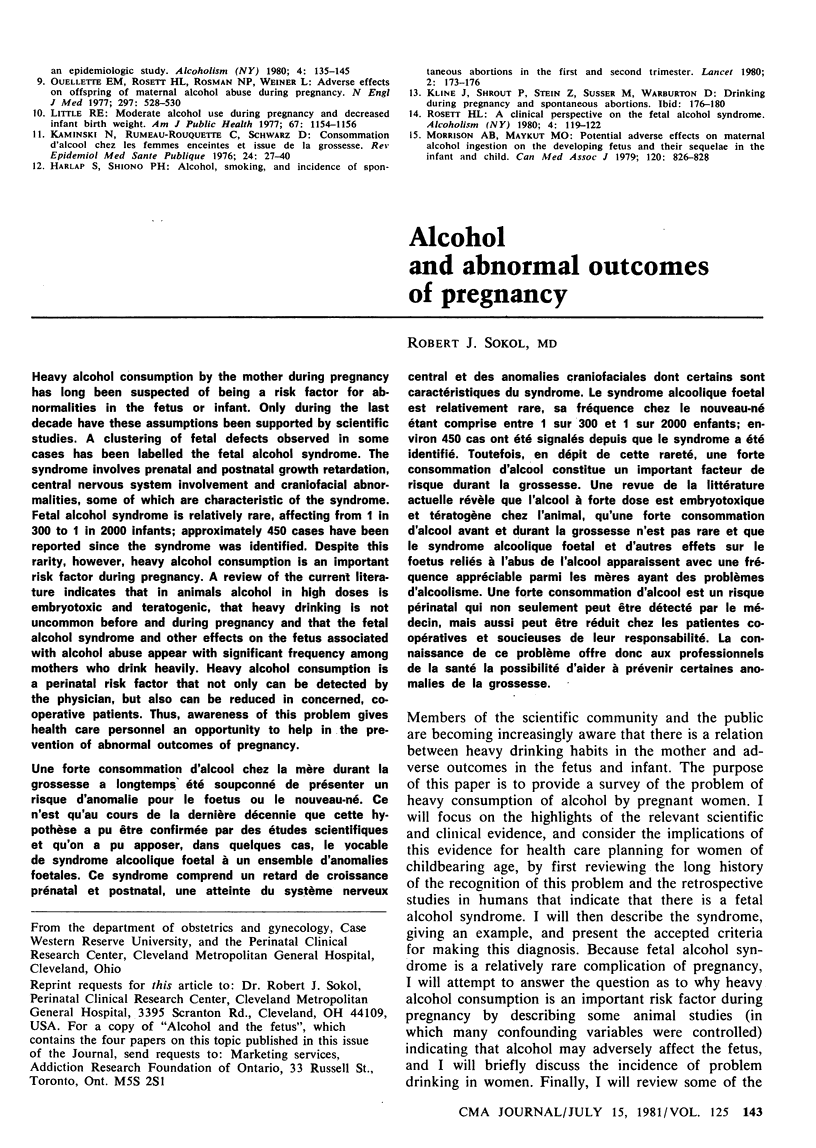
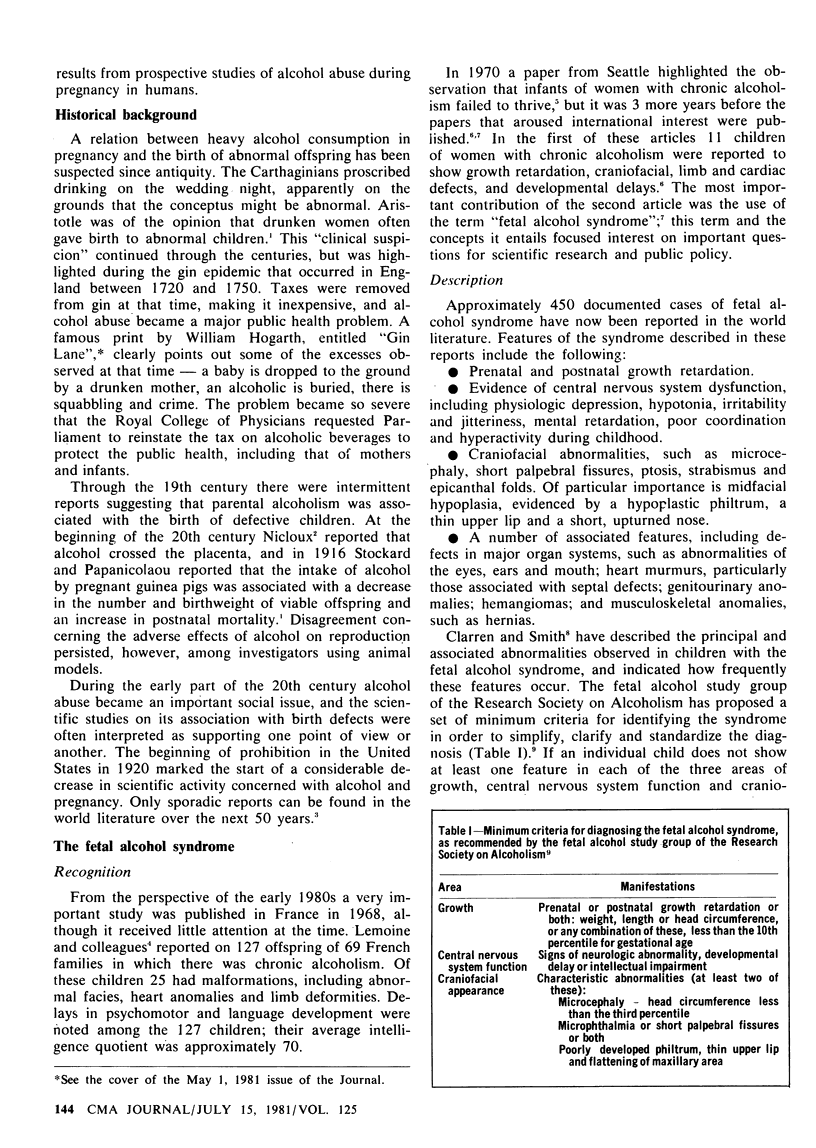
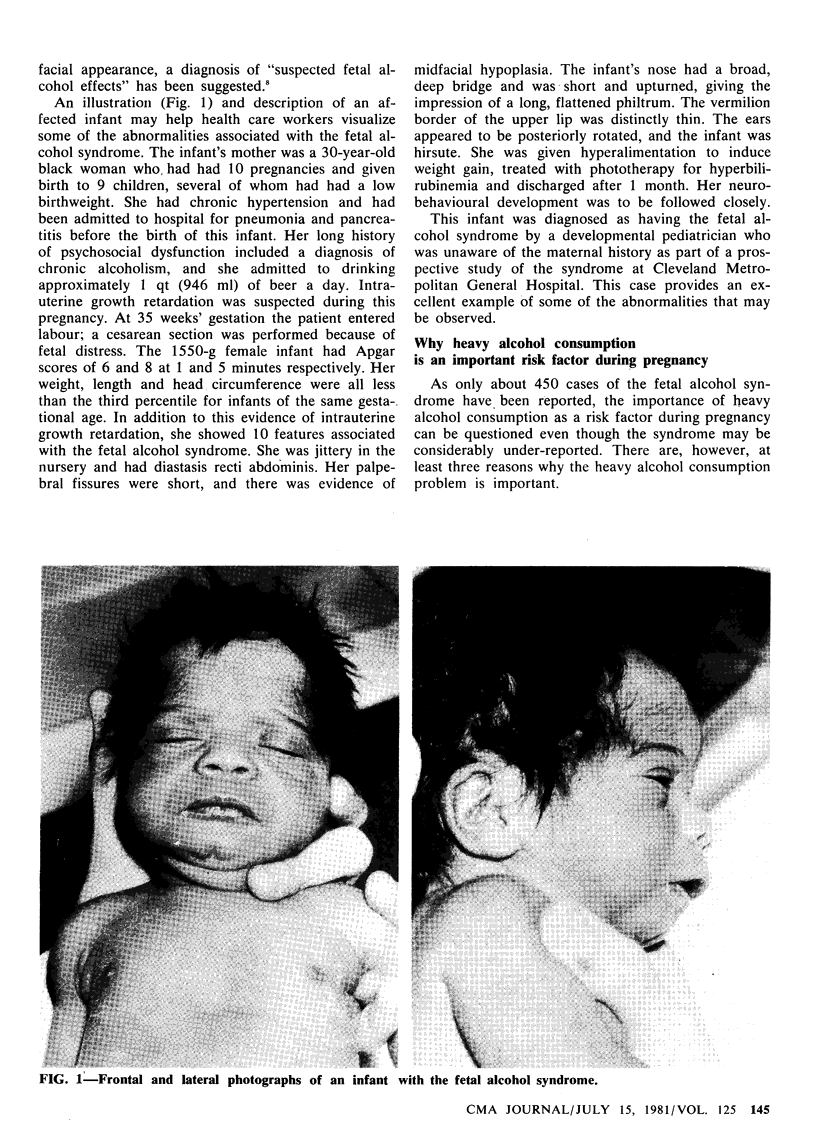
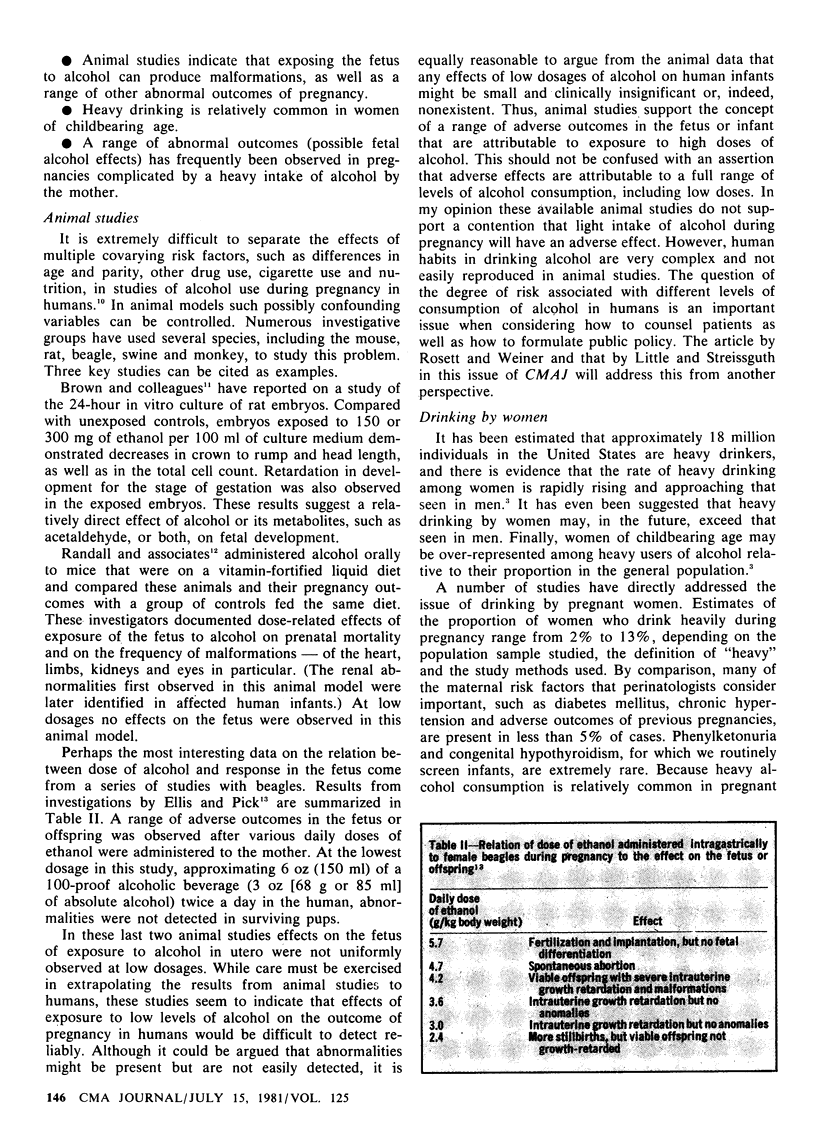
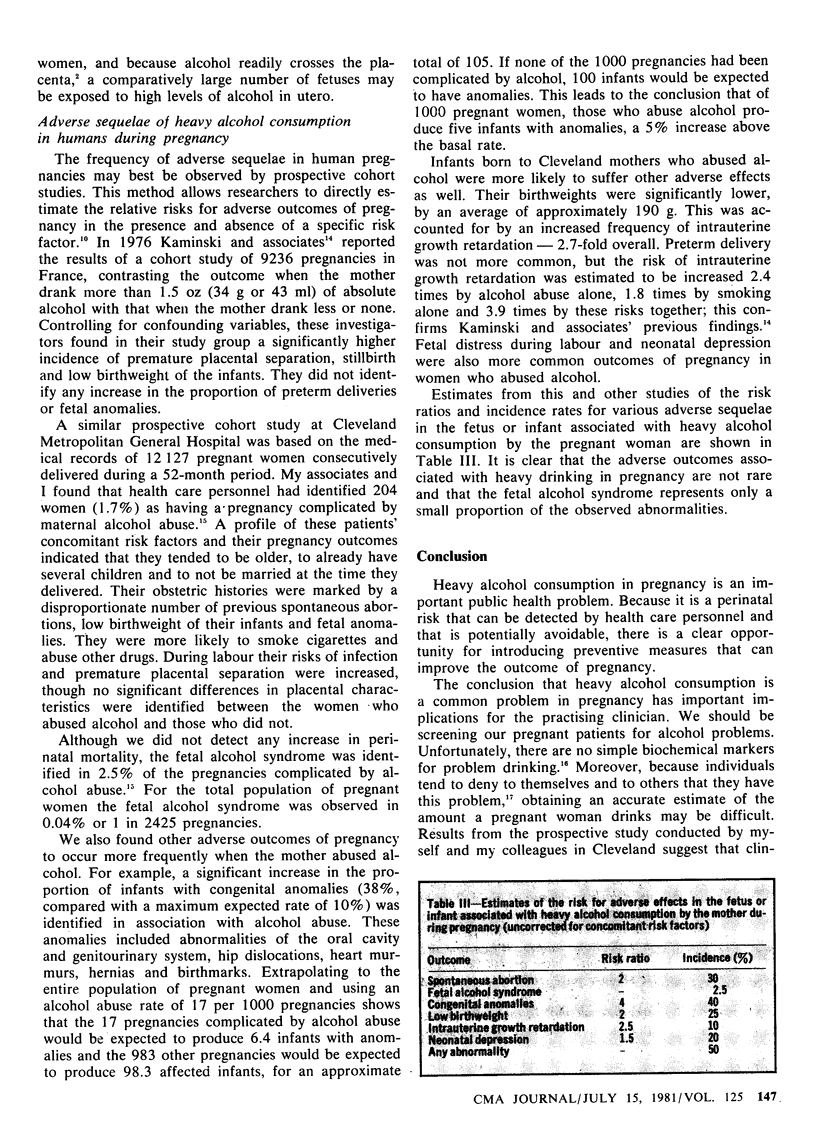
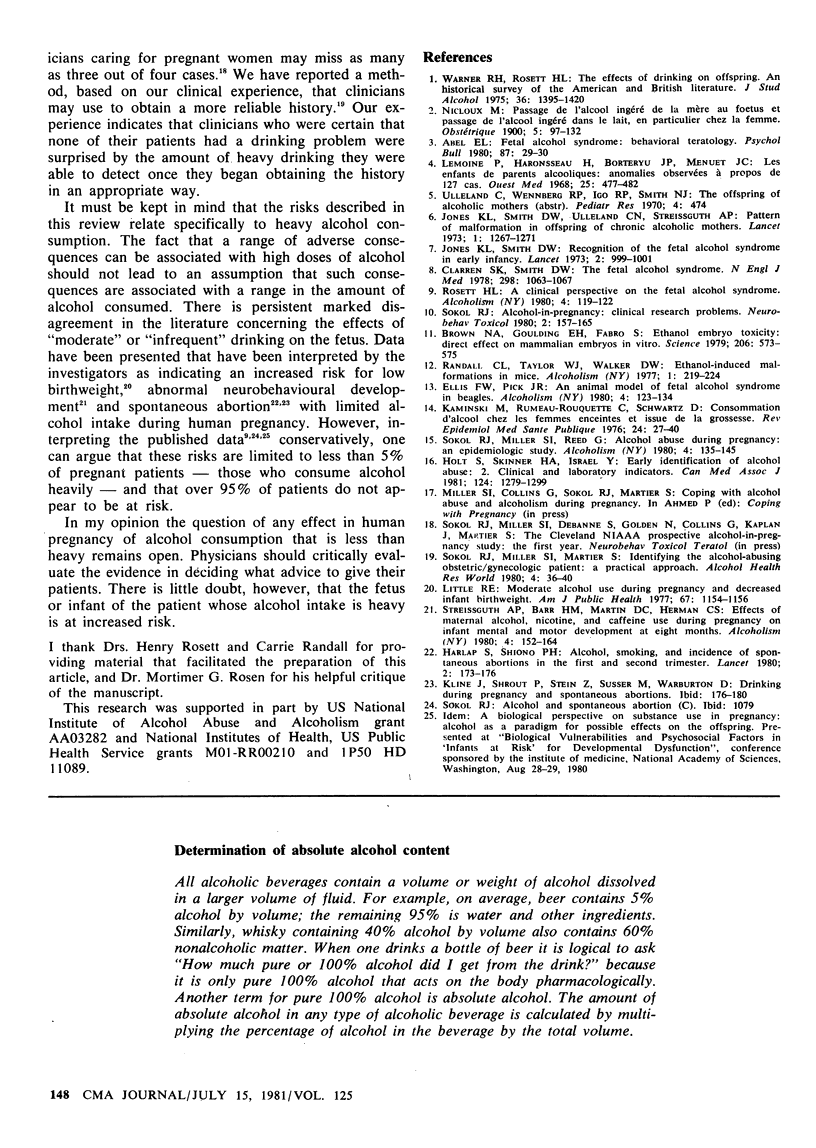
Images in this article
Selected References
These references are in PubMed. This may not be the complete list of references from this article.
- Abel E. L. Fetal alcohol syndrome: behavioral teratology. Psychol Bull. 1980 Jan;87(1):29–50. [PubMed] [Google Scholar]
- Brown N. A., Goulding E. H., Fabro S. Ethanol embryotoxicity: direct effects on mammalian embryos in vitro. Science. 1979 Nov 2;206(4418):573–575. doi: 10.1126/science.573922. [DOI] [PubMed] [Google Scholar]
- Clarren S. K., Smith D. W. The fetal alcohol syndrome. N Engl J Med. 1978 May 11;298(19):1063–1067. doi: 10.1056/NEJM197805112981906. [DOI] [PubMed] [Google Scholar]
- Ellis F. W., Pick J. R. An animal model of the fetal alcohol syndrome in beagles. Alcohol Clin Exp Res. 1980 Apr;4(2):123–134. doi: 10.1111/j.1530-0277.1980.tb05627.x. [DOI] [PubMed] [Google Scholar]
- Harlap S., Shiono P. H. Alcohol, smoking, and incidence of spontaneous abortions in the first and second trimester. Lancet. 1980 Jul 26;2(8187):173–176. doi: 10.1016/s0140-6736(80)90061-6. [DOI] [PubMed] [Google Scholar]
- Holt S., Skinner H. A., Israel Y. Early identification of alcohol abuse: 2: Clinical and laboratory indicators. Can Med Assoc J. 1981 May 15;124(10):1279-94, 1299. [PMC free article] [PubMed] [Google Scholar]
- Jones K. L., Smith D. W. Recognition of the fetal alcohol syndrome in early infancy. Lancet. 1973 Nov 3;302(7836):999–1001. doi: 10.1016/s0140-6736(73)91092-1. [DOI] [PubMed] [Google Scholar]
- Jones K. L., Smith D. W., Ulleland C. N., Streissguth P. Pattern of malformation in offspring of chronic alcoholic mothers. Lancet. 1973 Jun 9;1(7815):1267–1271. doi: 10.1016/s0140-6736(73)91291-9. [DOI] [PubMed] [Google Scholar]
- Kaminski M., Rumeau-Rouquette C., Schwartz D. Consommation d'alcool chez les femmes enceintes et issue de la grossesse. Rev Epidemiol Med Soc Sante Publique. 1976 Jan-Feb;24(1):27–40. [PubMed] [Google Scholar]
- Little R. E. Moderate alcohol use during pregnancy and decreased infant birth weight. Am J Public Health. 1977 Dec;67(12):1154–1156. doi: 10.2105/ajph.67.12.1154. [DOI] [PMC free article] [PubMed] [Google Scholar]
- Randall C. L., Taylor J., Walker D. W. Ethanol-induced malformations in mice. Alcohol Clin Exp Res. 1977 Jul;1(3):219–224. doi: 10.1111/j.1530-0277.1977.tb05876.x. [DOI] [PubMed] [Google Scholar]
- Rosett H. L. A clinical perspective of the Fetal Alcohol Syndrome. Alcohol Clin Exp Res. 1980 Apr;4(2):119–122. doi: 10.1111/j.1530-0277.1980.tb05626.x. [DOI] [PubMed] [Google Scholar]
- Sokol R. J., Miller S. I., Reed G. Alcohol abuse during pregnancy: an epidemiologic study. Alcohol Clin Exp Res. 1980 Apr;4(2):135–145. doi: 10.1111/j.1530-0277.1980.tb05628.x. [DOI] [PubMed] [Google Scholar]
- Streissguth A. P., Barr H. M., Martin D. C., Herman C. S. Effects of maternal alcohol, nicotine, and caffeine use during pregnancy on infant mental and motor development at eight months. Alcohol Clin Exp Res. 1980 Apr;4(2):152–164. doi: 10.1111/j.1530-0277.1980.tb05630.x. [DOI] [PubMed] [Google Scholar]
- Warner R. H., Rosett H. L. The effects of drinking on offspring: an historical survey of the American and British literature. J Stud Alcohol. 1975 Nov;36(11):1395–1420. doi: 10.15288/jsa.1975.36.1395. [DOI] [PubMed] [Google Scholar]



